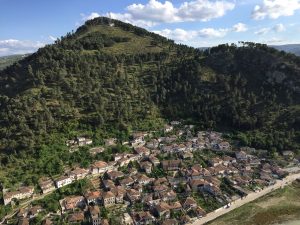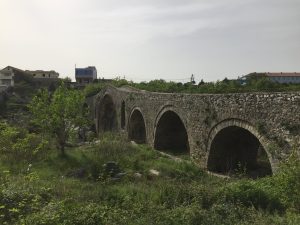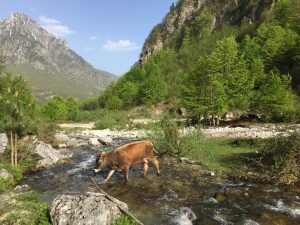Since 1992, Albania has been engaged in a process designed to pave the way for its integration into the European Union and has begun negotiations to join in 2022. To make this prospect a reality, particularly to meet the Copenhagen criteria established by the European Council in 1993, the country has embarked on a multi-dimensional reform process, which Tirana is gradually implementing.
 Albania applied for membership in the European Union in April 2009. In 2012, the European Commission recommended that it be granted candidate country status, subject to the adoption of specific reforms, particularly in the judicial and administrative fields. In October 2013, the Commission again recommended that Albania be granted candidate country status, which was finally obtained in June 2014. The official launch of accession negotiations was authorized on July 19, 2022 (at the same time as North Macedonia).
Albania applied for membership in the European Union in April 2009. In 2012, the European Commission recommended that it be granted candidate country status, subject to the adoption of specific reforms, particularly in the judicial and administrative fields. In October 2013, the Commission again recommended that Albania be granted candidate country status, which was finally obtained in June 2014. The official launch of accession negotiations was authorized on July 19, 2022 (at the same time as North Macedonia).
A European country on the doorstep of a troubled EU
Spared by the war in the former Yugoslavia, Albania was one of the first Balkan countries to establish a contractual relationship with the European Community in 1992 by signing a trade and cooperation agreement. Initially, the country made rapid progress towards reform. However, several reforms remain unfinished today, particularly in critical areas related to political criteria. Tirana is struggling to progress in democracy and the rule of law (freedom of expression, anti-discrimination, electoral system, justice, public administration, etc.) and in the fight against corruption and organized crime. The misinterpretation of Western neo-liberalism has created an unfinished model, resulting from very liberal reforms justified by adopting the acquis communautaire but hampered in particular by an intense lethargy in the fight against corruption. This situation has led to a massive exodus of Albanian citizens.
Over the past few years, the EU has favored a policy of deepening at the expense of further enlargement. Still, the return of wars (such as the one waged by Russia in Ukraine or the one between Israel and Hamas) and the profound questioning of the international security order raise questions about the validity of the “stabilocracy” rationale that has led us to be satisfied with an Albania that is stable externally but oscillates between democracy and authoritarian tendencies internally. It is time for the EU to rethink its enlargement strategy towards the Western Balkans.

Near Shkodër (© Théo Valerio).
There’s no doubt that Albania is a European country, as evidenced not only by its geography but also by its historical, linguistic, and cultural roots. The specificity of its geographical position on the European continent testifies to its European countenance, even if this has often been misinterpreted, as Ismaïl Kadaré pointed out: “The Albanian nation has its geography, its place in Europe, its history in Europe; its civilization is part of European civilization, and to call all this into question is absurd, macabre. A person must be in Europe or be expelled. In its most brutal form, the wording has become such that the Albanian nation has no place here, and it’s not so bad to be expelled from the continent. Sometimes this has been called displacement, sometimes deportation and the latest tragedy took place fourteen years ago, when the last attempt was made to cut part of the nation in two, to drive it out of Europe”(1) Albania, a European country, should therefore not see its accession to the EU as a utopia, but as a goal that can be achieved.
The European identity of the Albanians
The European identity of the Albanians manifests itself in the process of national identity construction. It draws on the historiographical background of the Albanian nation, with particular reference to the national Renaissance when the antiquity of the Albanian people was seen as an advantage over neighboring peoples. The Renaissance thinkers turned to the historical past to show that Albanian efforts to create an independent state were legitimate. These 19th-century Albanian thinkers drew on the work of French Enlightenment writers and philosophers, particularly on history, language, nationality, folklore, etc. Albanian Renaissance authors published fundamental jobs, such as Sami Frashëri’s Albania - What it Was, What It Is and What Will Become of It, published in 1899 and evoking the historical past of the Albanians, their antiquity, and their Pelasgic origins. A veritable ideological and political manifesto of the National Renaissance from the perspective of a free and independent Albania, this book is akin to a treatise within the framework of the Albanian national program. The author calls for creating an independent Albanian state in the face of Ottoman occupation and envisages the ambitious project of building a European Albania.

Valbonë (© Théo Valerio).
Language is another undeniable asset, an integral part of a people’s history, and an important identity vector. Handed down from generation to generation, it is the vehicle of representations, the tool par excellence for expressing, questioning, and humanizing the world. And yet, the Albanian people speak their language, of Illyrian origin and belonging to the Indo-European language family: “The Albanian people is one of the oldest peoples on the European continent, a founding people in its sphere, just as the great linguists agree in recognizing Albanian as one of the ten or twelve basic languages of the continent,” noted I. Kadaré(2)
Between the end of the 19th century and the beginning of the 20th century, the Albanian territories were fragmented twice: at the Congress of Berlin in 1878 and at the London Ambassadors’ Conference in 1913. This fragmentation is considered the most significant national tragedy, and its consequences continue to weigh heavily on the Albanian question. In 2020, German Chancellor Angela Merkel declared that “Europe owes a debt to the Albanian state, which it created in a fragmented way. It is the only country in Europe surrounded on all its borders by inhabitants who speak the same language. All Albanian-speaking territories should be united, creating a national Albanian state, in which Albanian-speaking territories would be fully included...”(3). Albania never had the intention of occupying the territories of neighboring countries; on the contrary, Albanian nationalism is a nationalism of resistance, which emerged in reaction to protect the national territories from the covetousness of neighboring countries, as the shrinking territories of the Albanian nation attest: “Albanian nationalism emerged in the second half of the 19th century in this spirit: it was a nationalism of resistance, of opposition to injustice. Albanians had to defend their language and culture at a time when they were suffering under the Ottoman yoke, which negated their identity, and when, along with Greek and Serbian nationalism, powerful, conquering, and aggressive nationalisms were taking shape, with unreasonable territorial ambitions”, points out historian Serge Métais(4).
Today, for reasons linked to their identity, history, and European spirit, the Albanians remain firmly in favor of their country’s entry into the European Union despite the delays in this process. Already convinced that they belong in Europe, they are confident that the European Union must welcome them sooner or later as part of its project to unify the continent.
Perception of the European project and regional cooperation
To achieve this objective, Albania’s leaders must be fully committed to carrying out the reforms required as part of the accession negotiations to present its citizens with a credible European project. However, the integration process implemented by the political class is neither democratic nor transparent. Genuine representative democracy would require the political elites to justify the delays accumulated over the years on the road to reform.
The Western Balkan countries emerged from totalitarian regimes whose primary aim was total control over the individual and society. As part of the process of European integration, the primary aim of political leaders is to build a democratic society in which the symptoms of totalitarianism are absent. Their task is to create, in both word and deed, a healthy environment for citizens to live together. To achieve this, leaders must tell citizens the truth and contribute to creating a space for freedom, deliberation, and action. Unquestionably, beyond nationalism, these countries must consolidate the rule of law as the foundation of a true democracy. They seek political leaders of integrity and incorruptibility, capable of leading them toward a credible and effective accession process.
While regional cooperation is promoted, it often runs into difficulties. For example, in 2021, the Open Balkans regional initiative set up a Balkan mini-Schengen between Albania, Northern Macedonia, and Serbia, while Kosovo and Bosnia-Herzegovina refused to join. Today, this initiative appears doomed to failure due to political divisions in almost all the countries in the region. The Open Balkans had identical objectives to those set out in 2014 by the Berlin Process, a German initiative to support cooperation between the countries of the Western Balkans. The Berlin Process was intended as a European platform to lead these countries towards future membership.
“If the love of Europe proves that you are European, then the Balkans are the most European place in the world,” as Ivan Krastev(5) put it in 2004. For the Albanians, the European project is indeed their future. The prospect of joining the European Union still comes up against the demands of Brussels and the slowness of specific reforms, but it is still perceived as Albania’s final destination.
Notes:
(1) “Ismail Kadare merr çmimin ‘Ali Podrimja’” (Ismaïl Kadaré receives the ‘Ali Podrimja’ prize), Zëri i Amerikës (The voice of America), September 2013
(2) Ismaïl Kadaré, Identiteti evropian i shqiptarëve (The European identity of the Albanians), Onufri Publishing, Tirana, 2006, p. 20.
(3) Spartak Ngjela, Tema (daily in Albanian), October 31, 2020.
(4) Serge Métais, Histoire des Albanais. Des Illyriens à l’indépendance du Kosovo, Éditions Fayard, 2006, p. 10.
(5) Ivan Krastev, « Enthousiasme pour une Europe imagée et salvatrice », in Les Européens face à l’élargissement. Perceptions, acteurs, enjeux, (edited by Jacques Rupnik), Éditions Presses de Sciences Po. 2004, p. 291.
Thumbnail: Berat (Albania) (© Théo Valerio).
* Haki Shtalbi is professor of Albanian history and geopolitics at INALCO, and a former ambassador of Albania.
Link to the French version of the article
Translated from French by Assen SLIM (Blog)
To quote this article: Haki SHTALBI (2023), “Albania: the European Union as final destination,” Regard sur l’Est, 11 November.
